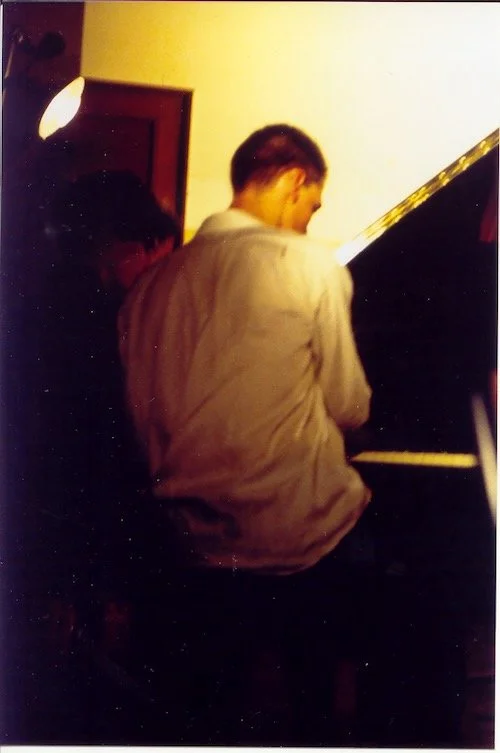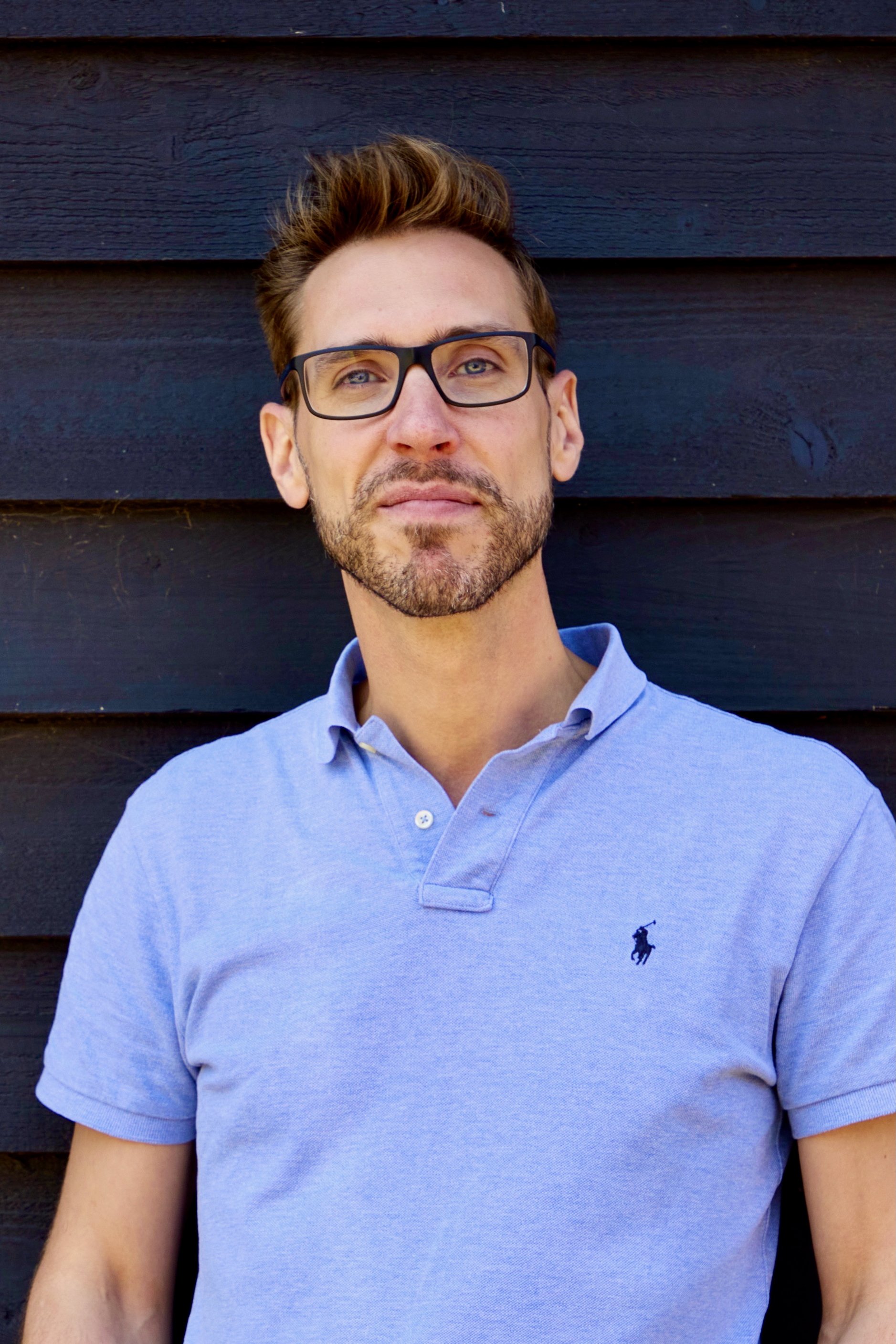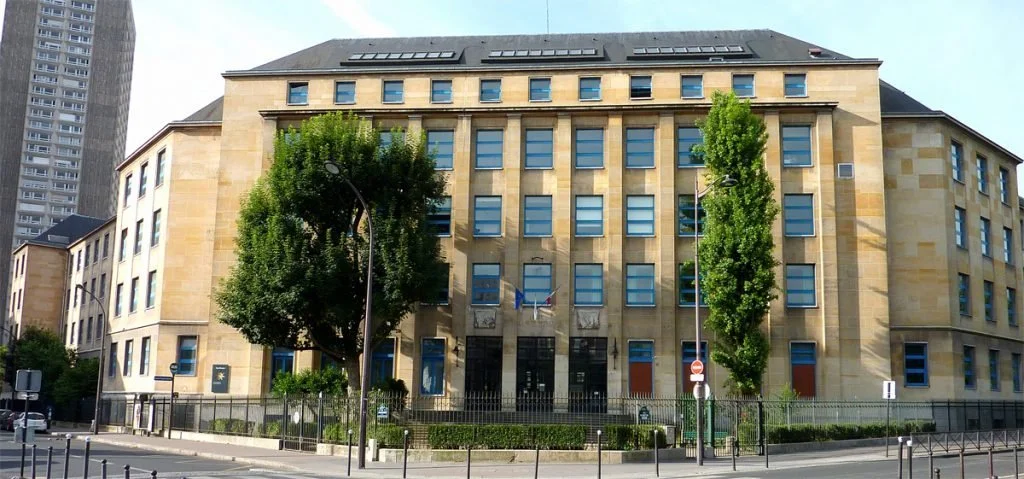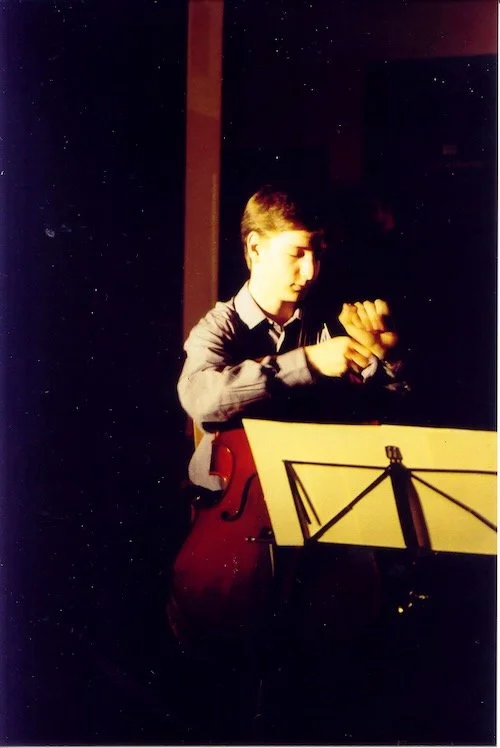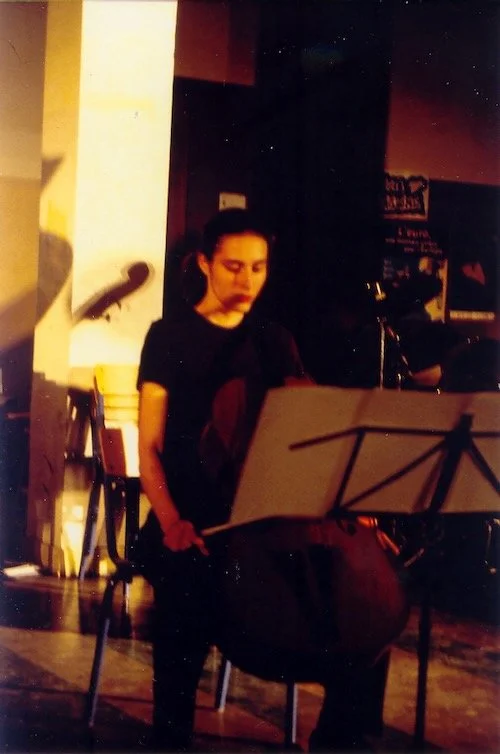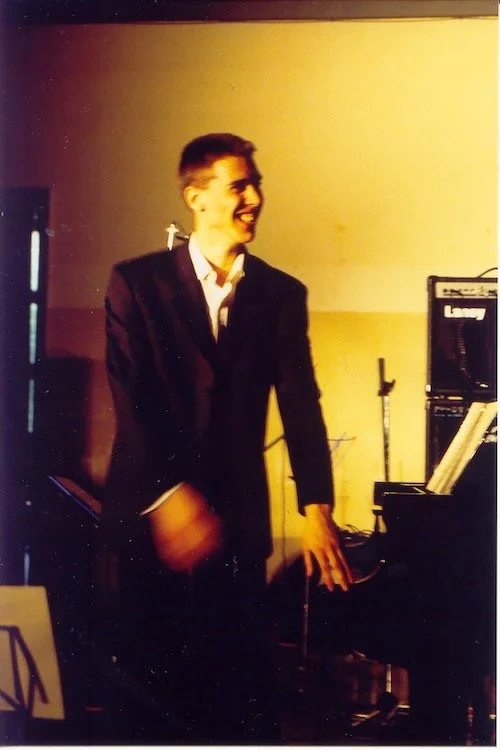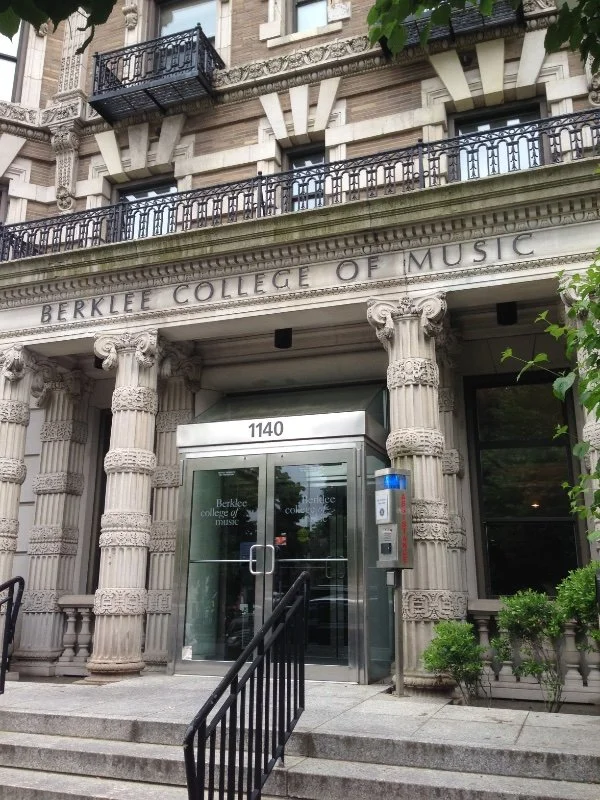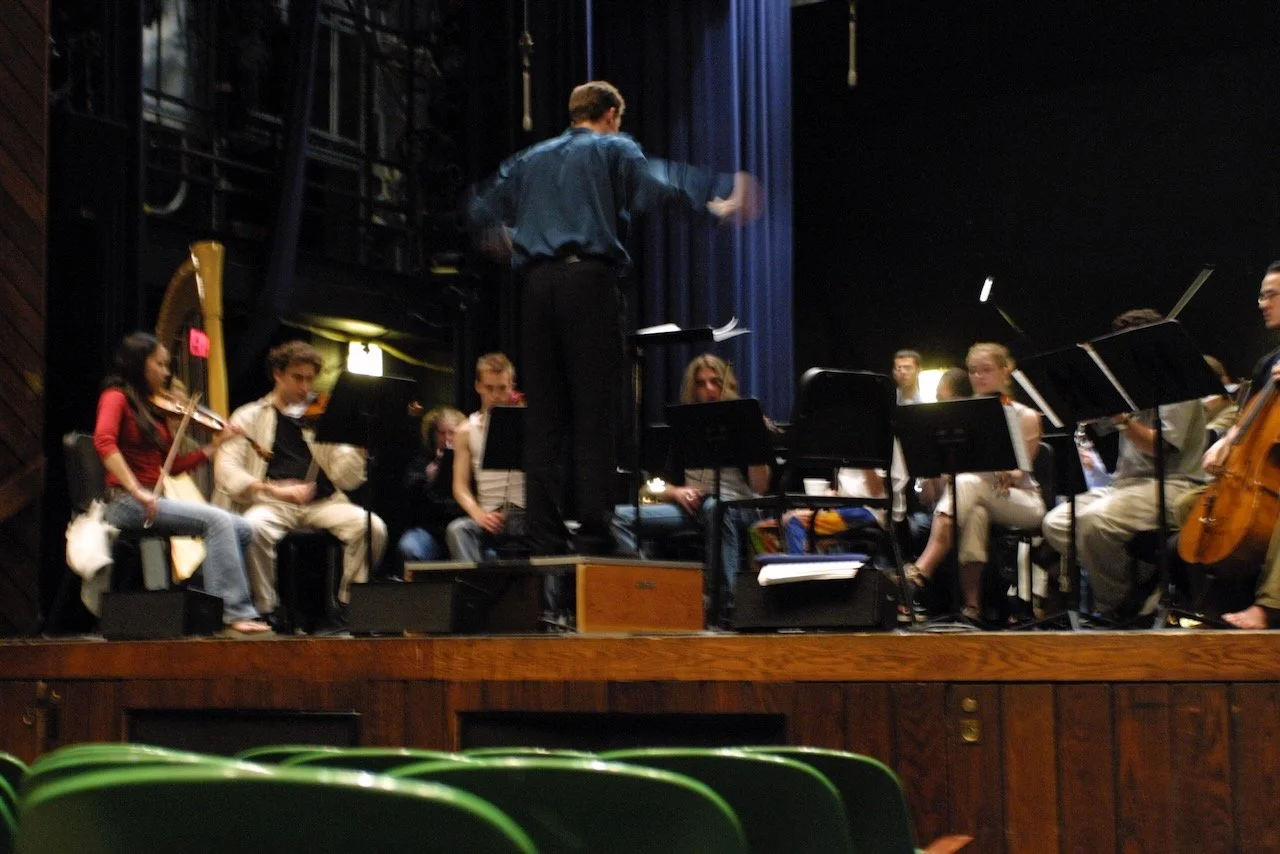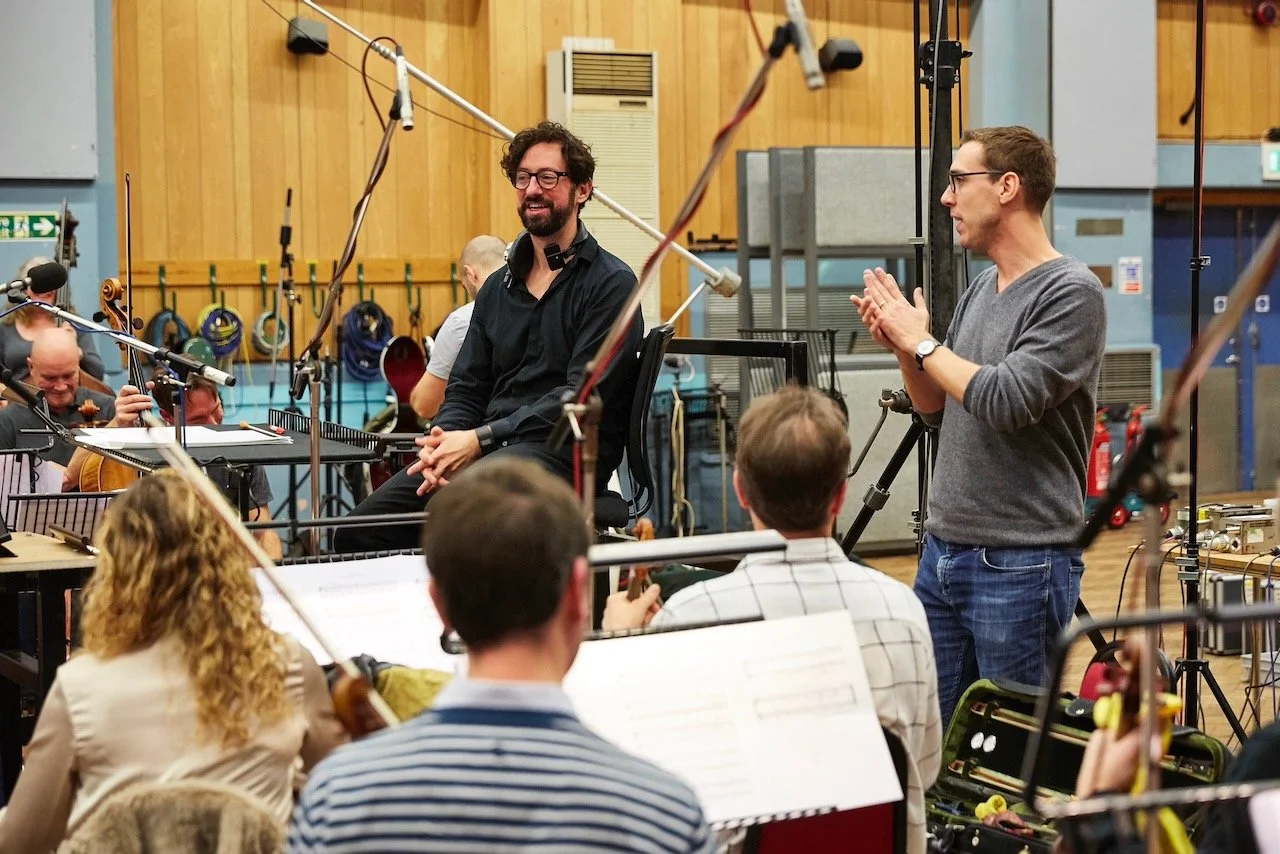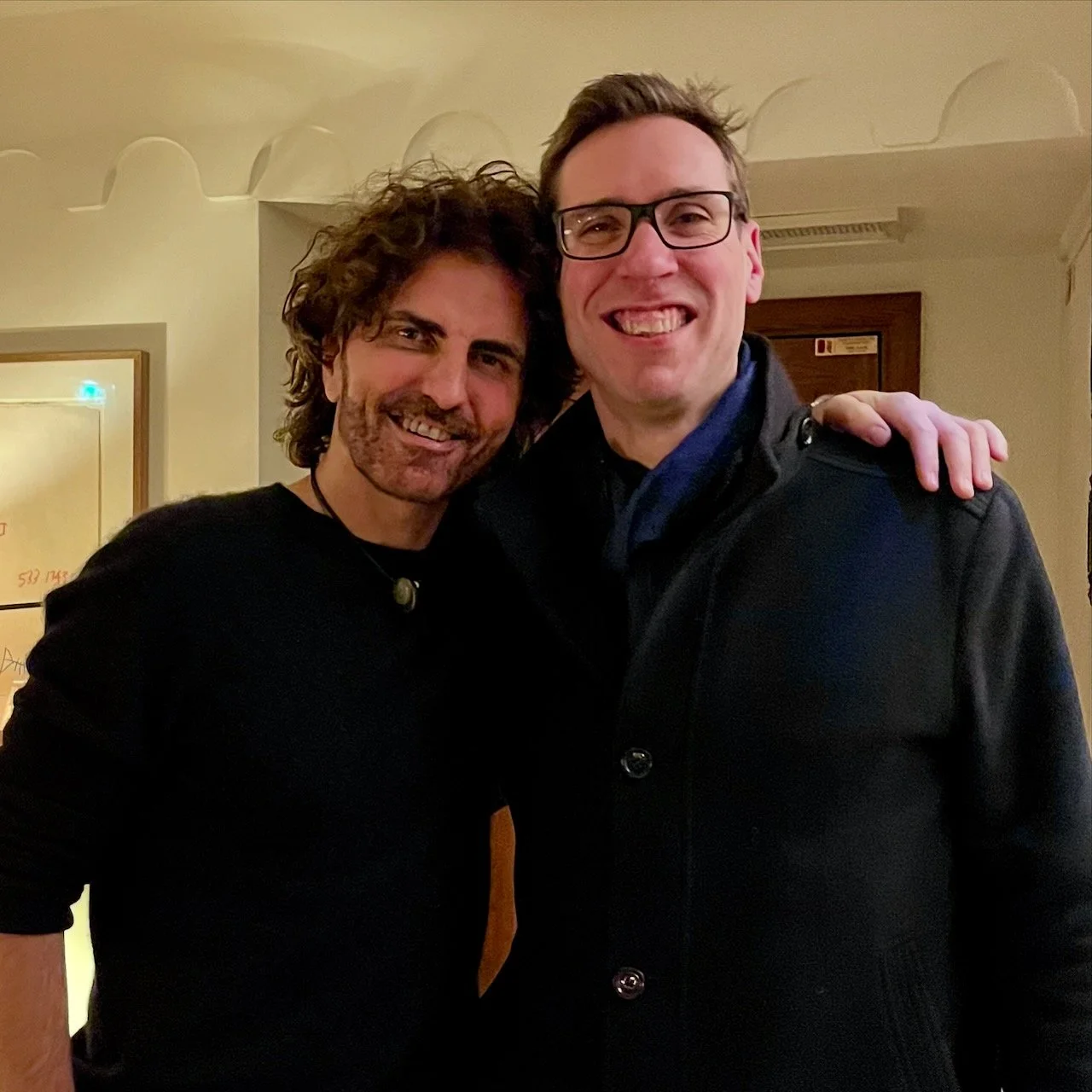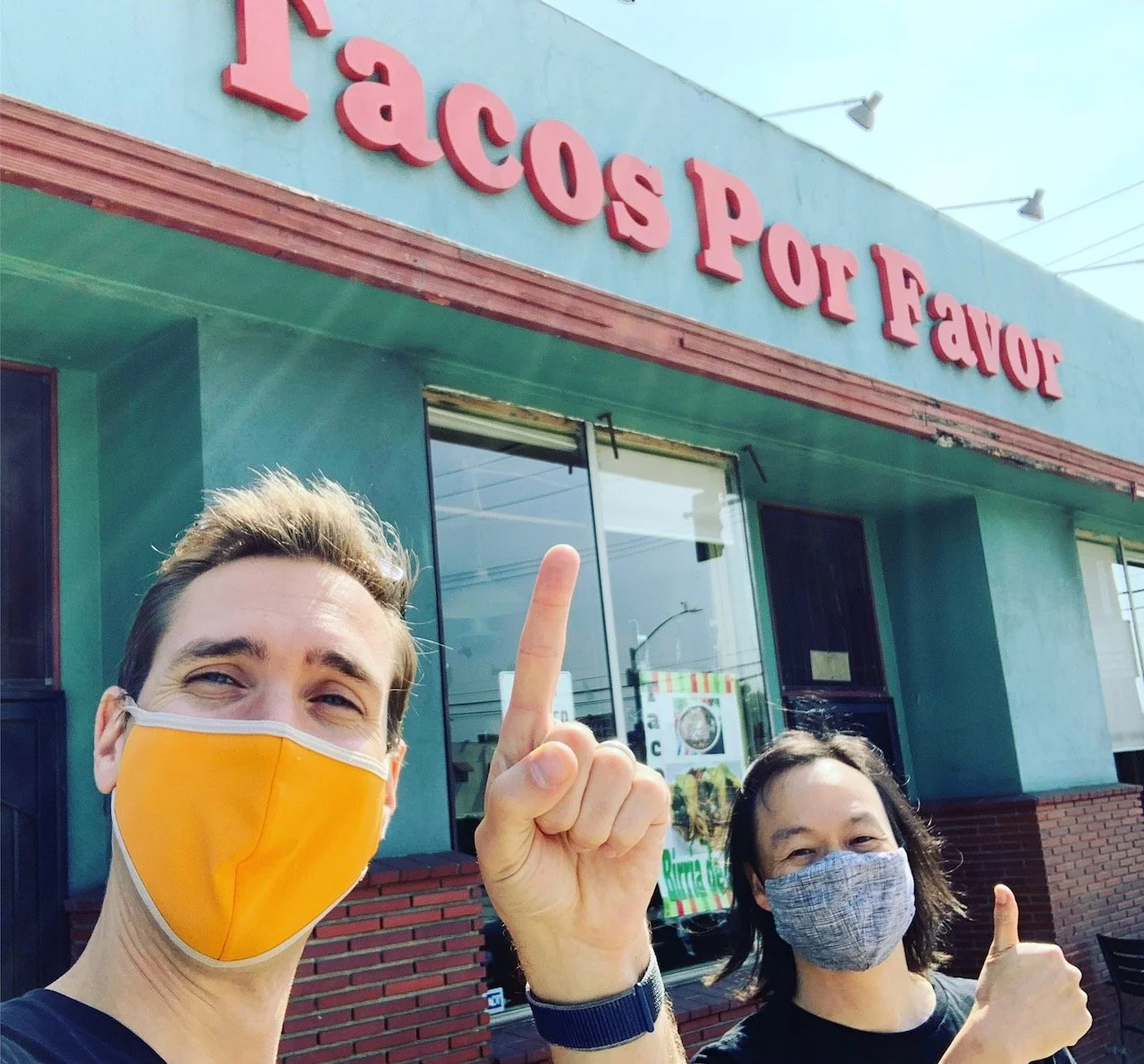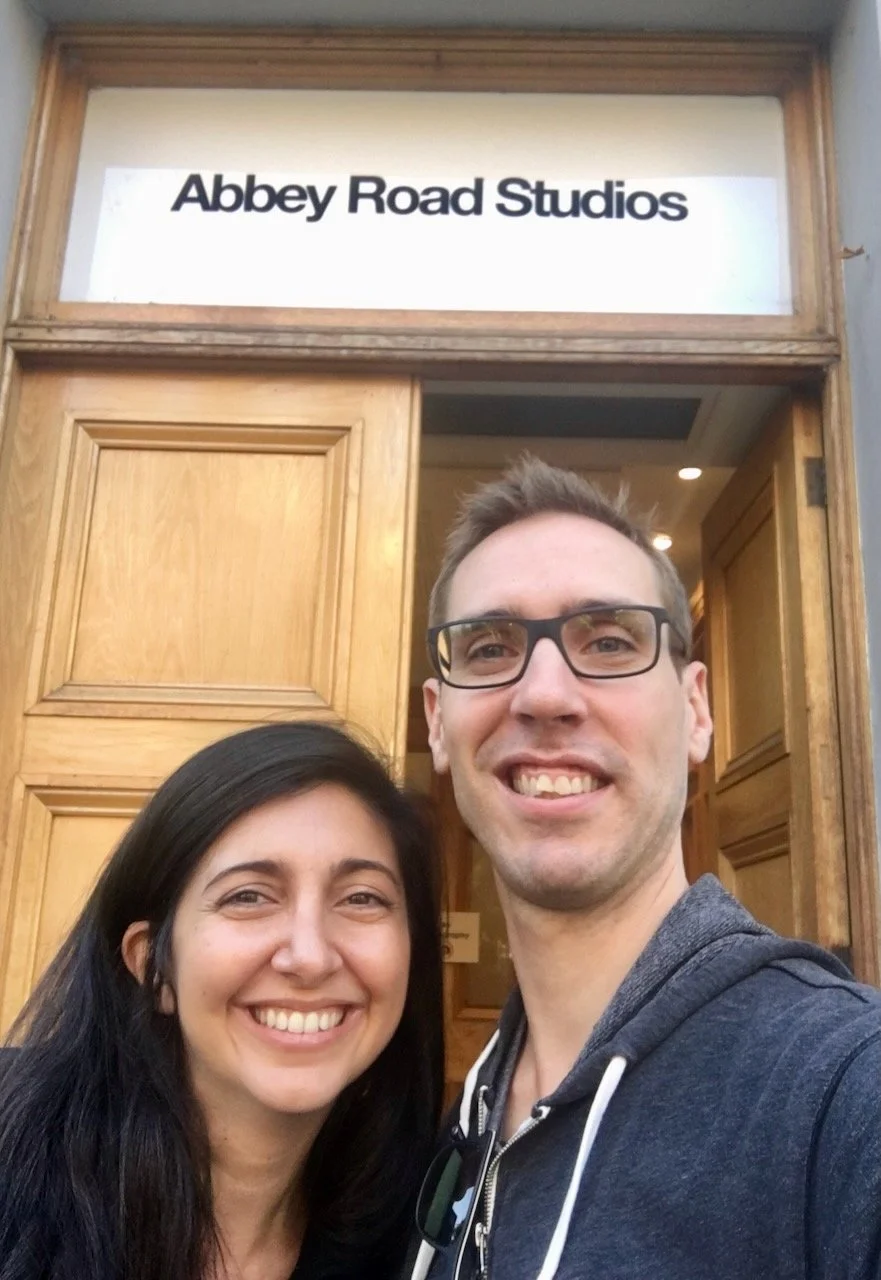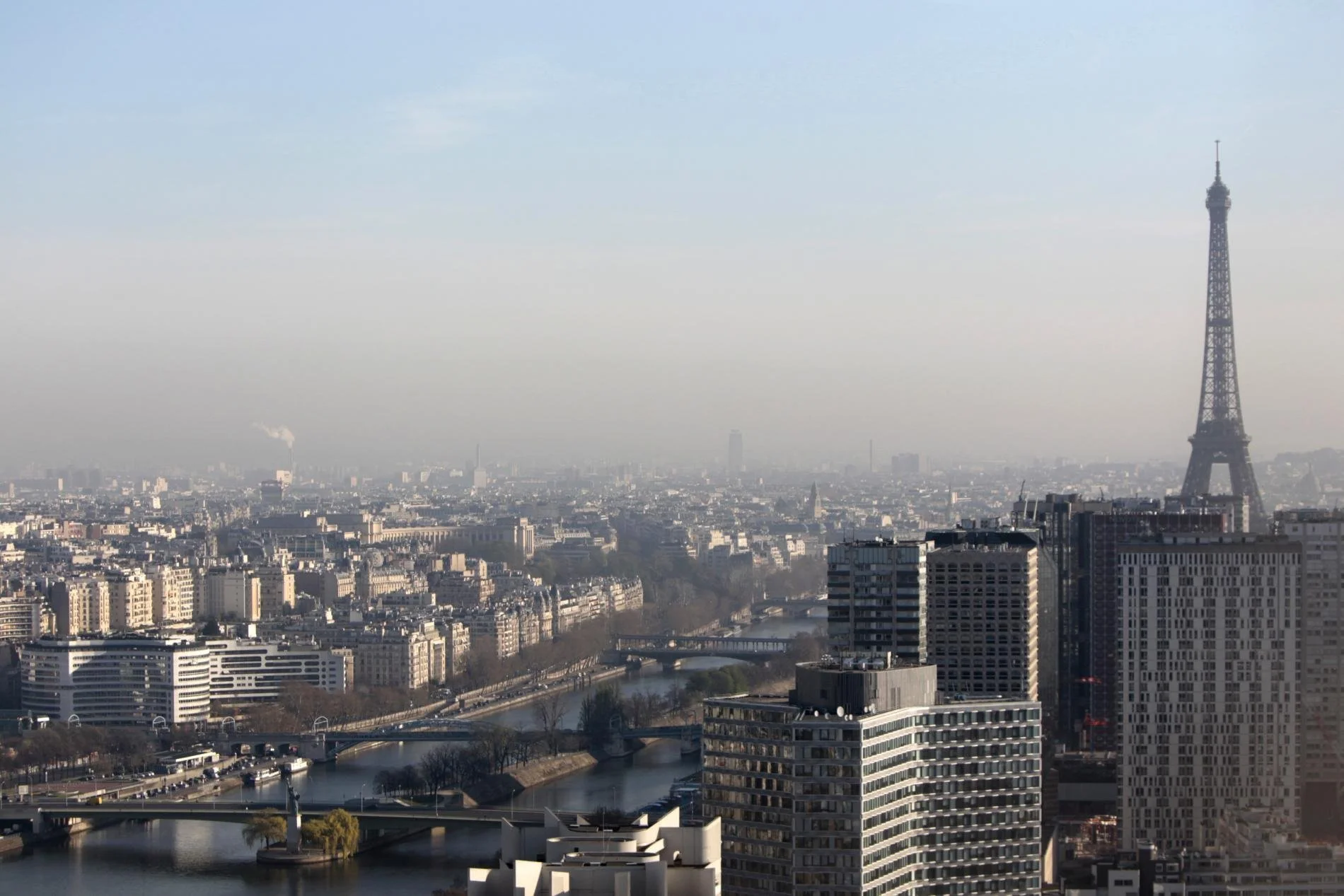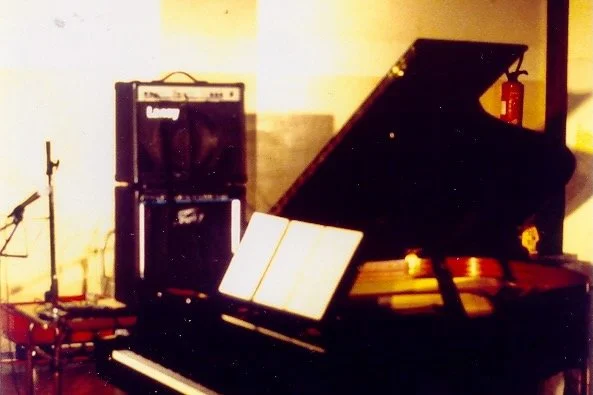
Finding The Echoes
An Artist’s Journey From Trauma to Rediscovery
After more than 25 years, I'm returning to public performance. This five-part essay traces the journey from childhood trauma through artistic suppression to rediscovering my voice—and why performing my own music in 2026 represents more than just a concert.
Part 1: Awakenings
In September 2025, I posted on my social media feeds something that I would never have thought possible even a year or so ago. I announced that, in the spring of 2026, I would be giving a concert of my own music.
In the past, I’ve shared news about upcoming film scores, albums, or events—but this feels entirely different: if I pull it off (and I certainly hope I will), it will be the first time I perform my own music live in more than twenty five years.
The mere act of publicly sharing it is actually only one step in a much longer process, seeds of which were planted in my mind as far back as four years ago. But the reason why it took me so long to consider doing it is the result of two distinct decisions: on one end, to dedicate myself to writing music for pictures (something I’ve wanted to do since I was twelve years old), and, on the other end, to willingly suppress the artist and pianist inside of me to avoid dealing with, and re-living in my head, over and over, years of trauma and failures.
And as such, before picking a venue, before choosing the musicians I will be performing with, or even before finalizing the myriad of details related to such a venture, the decision to share this idea with the world is a huge personal milestone. It’s the realization of a profound, inner desire, a flame that was first toyed with in youth, suppressed in the aftermath of trauma, then left dormant for decades — until it was reignited thanks to conversations with colleagues and friends, and, in parallel, a long, painful process of self-discovery.
The First Spark
I’ve been writing music since I was ten. As is often the case when one starts a creative endeavor, the first pieces I wrote were entirely for me, and naturally were written for my instrument: the piano. I wasn’t a very serious piano learner—for many years, playing classical pieces felt like a chore. But I liked the instrument very much, both as a listener and as a performer, and I especially liked the emotional effect its music had on me. So instead of practicing Mozart or Kulhau, I’d spend my practice time playing short doodles, little bits of ideas.
The earliest memory I have of writing a piece was when I placed my hands at both ends of the piano, playing random ideas, clashing or working with each other. I kept imagining an elephant (the low end) and a bird (the high end) battling it out. Other pieces were idiomatic to specific places and cultures (or so I felt). Not unlike the Debussy pieces I had to practice, my music always had to tell a story.
This creative relationship between my inquisitive mind and the instrument stayed tentative for a few years, but as I got better at playing, and as my musical knowledge expanded, I started getting more complex ideas. My first foray into writing a “serious” piece—serious enough that I wrote it down on a piece of paper—must have been around the age of fourteen. Not surprisingly for someone who was slowly discovering the world of Hollywood film music, it was highly chromatic and thematic—made of a sweeping melody played in octaves on the right hand against fast arpeggios anchoring the harmony on the left hand. It was tricky to perform (at least for me) but very personal in its unabashedly romantic vibe.
And it led me to an important realization: there was now, for the first time, on this piece of paper, out in the world, a piece of music that came from me, and felt like me.
An Unlikely Encouragement
I played that piece at home many, many times, but that environment never led to any kind of acknowledgment, let alone validation. My parents were never the demonstrative types (they still aren’t), and they never commented on it. My reality was such that not one person in my household—which included five siblings—seemingly cared at all about my early creative endeavors. No one ever stopped to ask what the piece was, or if I wrote it, or (God forbid) to comment in any way on its quality.
As a matter of fact, the environment I grew up in placed so little importance on the simple act of making music (be it performing it or creating it), that I was actually constantly interrupted by my parents directing me to do various chores or tasks, by my younger siblings running around the room, or by yells from one side of the apartment to the other.
And I would stay there, in front of the instrument, ignored in my naive desire to share a little bit of me with the world.
Still, I kept playing that piece wherever I could find a piano, until one day I played it at my aunt’s and uncle’s apartment. It was peaceful there; they had a beautiful Yamaha ebony upright piano which I was very fond of, and when my beloved uncle Michel heard me playing the piece from afar, he came by and told me, in his gentle voice, “that’s a really beautiful piece you wrote there.” He was, as far as I can remember, the first person in my life to compliment me on something I had created.
But he did so much more than that: he also encouraged me.
As I kept playing it, he offered: “It’s a great tune, but it’s so short—what comes next? You should expand it. Maybe write the next movement! You clearly have a knack for it—so instead of playing it over and over, why not write another one?”
My uncle wasn’t wrong. But what he didn’t know was that, around the same time, my relationship with music and the piano was taking a conflicting turn, where I was trying to reconcile the devastating effects of the sexual assault I was repeatedly being subjected to by my piano teacher while playing my instrument during private lessons (which was gradually getting worse), and a desire to not let that trauma overshadow my deepening love for the art and craft of writing and playing music.
Later that year, driven first from a desire to attend my local conservatory to study piano seriously, and second to escape my aggressor, I switched piano teacher. I had just turned fifteen.
Learning to Be Heard
By that point, my desire to make a life in music had come into focus and Lycée Claude Monet, with its dedicated music minor program, was the perfect step in that direction. Strongly wanting to put the past and its multiple traumas behind me, and supported by a music teacher who gave me a creative environment to imagine new possibilities in music, writing my own music soon became a significant part of my high school experience. (It didn’t lend itself to good grades, though, as I would spend many of my general education classes scribbling notes on score paper instead of following the course at hand.)
The piano was my instrument, but it wasn’t enough: I wanted to expand my possibilities. I fondly remember writing my first piece for cello and piano, titled “Optimism 2017”, which was a neo-romantic, melancholic re-imagination of what could happen if the world of Blade Runner actually came to fruition. (The movie-freak in me was already alive and well.) My classmate Veronique, who played the cello beautifully, suggested I write the piece during a spring 1999 school trip to Ireland, in a pub (of all places) where she concurrently introduced me to mixing Baileys with Coca-Cola.
On that day, writing music took another, deeper meaning: I could write for others, too!
It will be the first time I perform my own music live in almost thirty years.
In my senior year, my music teacher agreed to let me play a few pieces of mine at the end-of-year senior student concert. Eager to follow my uncle Michel’s advice, I decided to expand the world of “Optimism 2017” and make it a diptych. The second piece I wrote, titled “Persistence 2017”, was in the same minimalist vibe, but this time for two cellos and piano. I enlisted another classmate to join Veronique and I, and we performed the pieces back to back.
This was the first time I played my own music in any kind of public setting; the audience was, give or take, around 200 people—parents, students and teachers. I was even complimented by the school principal, who insisted on buying the scores (I had printed multiple copies just in case). I had entered the business of selling my music!
Hiding The Voice Within
Writing and performing my own pieces had been a rewarding experience, which should have tuned me into doing more. But the lingering effects of traumas which I was shamefully and secretly carrying, as well as a continuing lack of demonstrated interest from my parents in my artistic explorations, had started making a serious dent in my self-confidence. I was unsure of who I was—a victim, a survivor, a liar, a coward? What was the extent of my responsibility in my own traumas? Were they my own failings, or someone else's?
Looking inside was not just confusing, it was physically and emotionally painful. As a consequence, like most victims of trauma, I put on a protective shell around my truth. Past it, there was nothing to be seen—not even for me. Devoid of external validation regarding my budding musical endeavors, and constantly in search of acknowledgment and my own identity, exploring the artist inside of me was impossible.
But I still dreamed of writing music for film. And to that end, the uncertainty of looking inward gave way to the safety of emulating others.
As I was getting deeper and deeper in the exploration and discovery of film music—music written by such esteemed composers as Jerry Goldsmith, John Williams, or Joe Hisaishi—studying them and writing like them started to feel like the path to success. The equation was naively simple, but, I thought, a sure bet: “If I can be as good as the masters, I’ll be as successful as they are,” I would tell myself.
“Then, surely, the world will appreciate my music—and, in turn, my parents will finally be proud of me.”
It was the first time I played my music in a public setting.
This was my state of mind when, at the age of eighteen, I graduated high school and took the decision to move to Boston to attend Berklee College of Music: I would study the masters so thoroughly that I would understand the intricacies of how they did what they did, then go out in the world, apply these learnings to my compositions, work harder than anyone else, and have as successful of a career as they have had.
I was quite convinced that this perfect plan would give me the revenge over my traumas (proving to myself that I wasn’t a victim after all), as well as the interest and validation from my parents I had been missing all my life.
Of course, it was ill-fated. I didn’t find what I was looking for—because it was an illusion. And while what I did find allowed me to experience tremendous moments of joy creating music, gave me a successful career, and brought me financial stability… it would always feel incomplete.
It took me two decades to figure out why.
And it didn’t help that performing piano in public would soon become a traumatic experience as well.
Part 2: Breaking Point
In the summer of 2001, at the age of twenty, I arrived at Berklee College of Music in Boston to follow my passion for film music and begin my formal music studies.
In hindsight, though, leaving Paris and moving 3,500 miles away wasn’t just about my dream of a career as a film composer—it was to escape a toxic environment where the mere act of existing as myself felt impossible. How could I exist, when I didn’t even know who I truly was? When the search itself was discounted as futile? And when those responsible for my traumas, directly or indirectly, were all around me?
I didn’t realize this back then, but (not unlike most of my siblings), leaving Paris became a life imperative: fleeing “the nest” as far as I could was a necessity born from a struggle to, physically as much as psychologically, leave the past behind. And when I heard about Berklee and its undergraduate film scoring program—at the time, the only one in the world—it became the practical solution to this most basic need: to live.
Boston was where I could finally start my life, unburdened by my past traumas.
Arrival at Berklee
The Film Scoring program at Berklee had a comprehensive and holistic coursework spread over eight semesters. The first one had an emphasis on going back to basics, which was useful to make sure everyone had the same strong foundations.
Due to my training, I was already advanced in ear training and classical theory—but far behind in jazz, contemporary writing, and ensemble work. And it was mandatory back then to take two semesters of ensemble classes (where you basically learned to play in a band) and four semesters of private piano instruction.
Fully intending to leave the past behind, I was happy to take both—one to force me to push my boundaries, the other to finally improve my piano skills, which were lacking, especially considering I had been playing for 14 years by that point.
But, really, after what I had lived through, who could blame me?
Learning to Practice
Buoyed by the knowledge that John Williams had once been a high-demand piano player in the Hollywood studio system, I began practicing like never before, four hours a day on average. This, in itself, was an interesting development. I seldom remember seriously practicing piano before Berklee. I would play, yes, but never with any kind of focus. In fact, I had never even learned what “practicing” meant.
I certainly didn’t grasp the concept of regularity, and could go weeks, or even months, without sitting at the keyboard.
The instrument, back in my teenage years, carried with it a loaded duality of attraction and rejection: the idea to play music was alluring, but willingly sitting at its keys meant facing the reality of my predicament—in the same room where the weekly assaults took place.
It was only at the end of my high school years, when I committed myself fully to studying music seriously, and with my assaulter physically out of my life, that I was able to sustain just about one hour of practice per day.
Once at Berklee, I experienced how practicing long hours could be mentally and physically taxing. The practice rooms themselves were brutal. Just big enough for an upright piano, a bench, and space to open the door, they were completely soundproofed and treated acoustically to absorb as much sound as possible. It was dead inside. Solid gray in appearance, with cold neon lighting, thick, heavy doors with a small, rectangular triple-pane window, and the air conditioning incessantly droning, you could only describe the environment as claustrophobic.
Spending four hours a day in there was an act of sheer mental fortitude—a feat I was proud to achieve for multiple semesters. I wanted to get better, quickly, and this was my key to improvement. So I persevered… to the point of thinking that maybe, like John Williams, I could one day be making a living playing the piano.
Reality Check
One morning during my third semester, I went to the piano rooms to get my first two hours of practice, as I would usually do before classes. I met a fellow piano student there—an excellent player who wanted to become a professional musician after Berklee—and we chatted for a few minutes. Later that day, after my classes were over, I came back to bag another couple hours of practice. I met the same classmate. She had been here, practicing, the whole day. Nine hours, to be precise. And yet even *she* was not guaranteed of a career as a professional pianist. While I could barely sit through four hours of practice per day!
It suddenly dawned on me that playing the piano professionally was not going to be in my cards. I just would never be able to study hard enough, yet alone compete. Against what, against whom? Who knows what came to my mind that day, but the mindset switched completely. From then on, piano became a tool—a means to write music.
I had to keep playing, however. Deep down, I was trying my very best to keep the connection alive, because I didn’t want to quit it.
I liked playing.
But I also was afraid of what failure as a piano player might mean about the victim I was working so hard at pushing away. “If I fail at the piano, then surely my assaulter has won,” I told myself, both consciously and unconsciously.
I didn’t want him to win.
Carrying On
This is one of the reasons why, even though studying your instrument wasn’t mandatory at Berklee after the fourth semester, I chose to continue private lessons. I was also fortunate to have an exceptional teacher, Neil Olmstead, who was demanding yet kind. A jazzer with deep classical sensibilities, exacting with music while open to personal interpretation, he embodied everything I had hoped for in a piano teacher.
At the end of my second year at Berklee, Neil suggested I take part in his student recital. The idea of performing live was anxiety-inducing—likely tied to what failure at the piano might signify about my struggle to pretend as if I was fine—but I really enjoyed the piece we had chosen, the “Corrente” from J.S. Bach’s Partita VI. Despite massive stage fright, that recital went well enough; I was proud to have learned the piece by heart (I had, and still have, crippling memory deficiencies), and I felt the performance itself was solid. While I hadn’t over-achieved, I had at least met the standards I had set for myself.
The following year, now taking elective private lessons, Neil again encouraged me to perform in his recital. This time, the selected piece was the “Toccata and Fugue”, again from Bach’s Partita VI. Emboldened by the previous experience, wanting to rise to the challenge again, I convinced myself I could master it as well—and perhaps do even better.
But the closer I got to the concert, the more anxious I became. My fingers knew the piece, but my mind felt detached. I couldn’t fully grasp the fugue’s structure, the harmonic progressions, the tonality shifts, the dialogue between the thematic lines.
To acclimate to the recital setting, I played the entire piece by heart for a close friend. It went fine enough, without any major hiccups. But playing it, something felt missing, like I wasn’t connecting.
My copy of J.S. Bach’s Partita VI (Click to Enlarge)
The Last Recital
The concert came, and with it, the start of the performance, which I was dreading more and more.
The Toccata started the piece, and although technically challenging, it went perfectly well. Then along came the Fugue. As I had countless times before, I started playing it and everything seemed fine. But after a few measures, questions began to jostle in my head.
“What measure am I on?”
“What is coming next?”
“Do I even know what’s coming next?”
My fingers, unaware of what was happening in real time, kept moving, as if driven by some ungodly force. “Wait—I don’t know what’s coming next.” Assaulted by uncertainty, my brain stopped.
And then the fingers stopped, too.
The whole room—the whole universe, really—fell silent. I felt as if I had fainted, yet I was standing upright on my bench. My eyes stared straight ahead: there was nothing to see.
My teacher, seated in the audience, helpfully suggested I start the fugue again. The words made no sense. What fugue? There was no fugue in my head. There was just a void. And the deeper I looked, the more void I found.
After what felt like an eternity—but which was surely only a few seconds—I stood up, turned slowly, and mumbled, both to my teacher and to myself: “I can’t. I just can’t.” As I began to leave, some people in the audience, likely trying to be supportive, tentatively started clapping. It made things worse.
I had failed—why were they clapping? I didn’t need their pity.
I waved them away, shaking my head.
I arrived at the empty backstage and broke down in tears. These weren’t just tears of sadness—they were tears of anger. Anger at what? Looking back, surely anger at my situation. Anger at my aggressor. Anger at my parents, for ignoring me, for missing all the signs, for leaving me to emotionally fend for myself.
But back then, I couldn’t see it—I wasn’t a victim, remember? So instead, I directed that anger inward.
Misdirection
Sobbing, trying to get enough air to my lungs, I couldn’t stop berating myself. “What… what the fuck was that?”, I asked out loud. “Is that really the best you can do? You leave home, move 5,000 kilometers away… only to fail?”
I finally sat down, my head between my knees. I stayed there for some time, the tears slowly drying up. I regained my composure—and I left.
This was the last time I performed piano in public, in any kind of formal setting.
The anxiety of breaking down in the middle of a performance has been following me like a ghost ever since. I’ve stayed away from playing piano in public (even amongst friends and family), and when I have allowed myself to play, I would typically only improvise. Performing pieces—including my own compositions—was avoided for the fear of not remembering them and stopping mid-way.
The dread of losing control—and the irrefutable fact that the piano had now become a vessel for my past traumas—meant that performing publicly at the instrument was no longer an option. Failure at the keyboard was now, more than ever, the physical manifestation of the trauma I had tried so hard to bury.
And I never wanted to experience that ever again.
Boston was where I could finally start my life.
“If I fail at the piano, then surely my assaulter has won.”
The gorgeous, but somehow dreaded, Fugue (Click to Enlarge)
Berklee’s David Friend Recital Hall
I wasn’t a victim, remember?
As I had done before, I told myself I would survive this—just as I had survived everything else. That I would march on, if only to prove to myself that I wasn’t a victim of what, I believed, were my own failings.
The idea of being a performing musician, at least, wasn’t completely dead. But I had to tweak it. By then, I had already discovered a love for the craft of conducting, which I first encountered during my freshman year at Berklee. As a lover of orchestral music, I came to realize that the best way to shape and experience it was to be up on the podium, in the middle of the orchestra.
It required discipline, intellectual thoroughness, deep curiosity, connection between mind and body. I was good at it, and it looked impressive enough that I could project how becoming a famous conductor would most surely impress my parents. (Still then, and for many years to come, a subconscious thread).
But more to the point, with a score always in front of me, I felt in control. It was safe—especially since I was studying and performing other people’s music. So I decided to channel my energy into that, instead of the piano.
Conducting was safe, indeed—but not unlike writing in others’ voices, it also kept me away from my own.
I wouldn’t realize that until many years later.
First time on the podium: recording a fellow classmate’s piece with the student orchestra I founded at Berklee.
Part 3: Finding My Voice
It isn’t easy when your first true musical love is the work of someone like John Williams. I first heard his music in 1993, when Jurassic Park opened a door I didn’t know existed. I was twelve, and instantly captivated.
Over the years, I’ve tried to understand why his music resonated with me so deeply, and the best explanation I’ve found is that it served as a bridge, connecting my love for singing melodies and the orchestra—nurtured in a household where my parents listened almost exclusively to classical music—with my emerging fascination for cinema.
It took several years—and countless hour-long searches through the aisles of my local record stores—to explore even a fraction of Williams’ vast body of work. Yet by the time I reached high school, I was convinced, without a hint of doubt, that he was one of the greatest composers who had ever lived. (An assertion he would object to.) Each discovery only deepened my fascination: his music became a world I got lost in, where I rejoiced, laughed, loved, cried, and feared. If I wanted to make an audience feel that, then it was a language I desperately needed to understand.
Unfortunately, in parallel with my growing desire to write music, the weight of my personal traumas was quietly eroding my self-confidence.
I wanted, more than anything, to stay away from my true self—the fractured, vulnerable part of me that no one else could see—and the safest way to do that was to adopt a persona, to project outward rather than confront inward. Pretending to be someone else became my shield. Much like a young chef meticulously following a master’s recipe, I believed that if I could learn to write exactly like John Williams, success would naturally follow.
Channeling The Masters
The logic was simple, almost comforting: emulate the masters, and the world would recognize talent; I would prove my worth; and perhaps, I hoped, find some validation I had long been denied. This mindset is what led me, in my high school senior year, to compose a near replica of Star Wars’ “Princess Leia’s theme” for the graduation concert—a lazy homage, certainly, but still a study that felt like the start of my new life. (The performance went poorly.)
Later at Berklee, my desire to “follow in the footsteps” of the film music giants extended beyond Williams. Before even stepping into my first formal film music class, I had devoured the Richard Davis’ course book, Complete Guide to Film Scoring, cover to cover, memorizing every details as if my life depended on it (in retrospect, maybe it did).
My soundtrack collection—brought from Paris—was approaching 200 CDs. I was a film music junkie, absolutely, but my focus was clear: neo-romantic, orchestral composers like Alan Silvestri, Jerry Goldsmith, James Horner, and others whose scores balanced sweeping melodies with cinematic drama. These were the composers whose work inspired me, whose techniques I wanted to comprehend, and whom I felt I should channel if I wanted to succeed.
And so, when it came time to hand in film composition homework, it felt safest to write like them. If I was successful at it, I believed a teacher would most certainly give me a good grade—and if not, they simply weren’t very good teachers. (It worked, as my GPA could attest). I spent much of my time looking to other composers for guidance, trying to mirror their style rather than listen to my own voice. How could I listen anyway, when I thought there was nothing to listen to? I feared expressing originality or singularity, worried that it might draw criticism to a side of myself even I was unsure had any value.
To protect my sanity, I was sidelining my deepest artistic instincts in favor of logic—and, I thought, rationality.
In The Shadows
This rationality helped when I moved to Los Angeles in late 2005. I entered an industry that thrived on recycling the latest trends from highly singular composers—especially through the use of temporary tracks that directors or picture editors would synchronize to their work-in-progress cuts. When I arrived, for example, many films were « temped » with Thomas Newman’s music, following his innovative scores—and Oscar nominations—for American Beauty and Erin Brockovich. In fact, the very first film I ghostwrote on, A Little Thing Called Murder, was temped relentlessly with Newman tracks, to the point where the final score was almost entirely shaped by the temp music.
That cautious approach to risk didn’t affect me directly at first; I was soon fully absorbed by my work as an assistant to composer William Ross and as an orchestrator for other composers, roles that demanded a great deal of adaptability. My job was to operate in the shadows, ensuring that my clients’ music was delivered on time and at the highest possible standard, while never drawing attention to myself.
In truth, I felt incredibly fortunate to have the opportunity to participate in such projects. Unlike many of my former classmates who struggled, burned out, and left Los Angeles altogether, I was earning a living in the film music industry. So even though I didn’t have a voice of my own (a consideration that wasn’t on my radar at the time), I was consistently working.
Being a craftsman had always been my goal, and I was fulfilling it—what was there to complain about?
At some point, though, it hit me: I had learned everything there was to know about helping other composers achieve the careers they wanted. It became clear that if I wanted to be a composer in my own right, I would need to start building my own path—and that meant actually writing music again, something I hadn’t done in nearly five years.
I had no idea what side of myself I would find there.
Writing It Safe
But alas. As a budding film composer, often overwhelmed by the task and frequently asked to stick close to the temporary music tracks, I quickly fell back on my old habits. My safest strategy was once again to emulate the masters—this time, the ones the director had chosen—while staying “original” enough not to get sued. This was especially true when writing additional music, where the goal is, almost by definition, to sound like the composer you’re supporting—and I did that plenty of times.
That mindset wasn’t bad for business: being highly adaptable brought me ample work. From 2010 to 2015, I scored over twenty films, as composer or additional writer, across a variety of genres. I was able to apply numerous writing techniques and tricks I had learned while assisting other composers, and I felt I was finally getting a solid grasp on the organizational, technical, and diplomatic challenges of writing music for film.
I’m proud of what I created during that time. It works both in the films and on the albums, and my clients—the composers, directors, and producers—were happy. Which I had always told myself was my primary goal: after all, how could I have a career without happy clients?
Through it all, however, the common factor was that I would always come second, my own musical ambitions quietly taking a back seat to the collaborative work I was determined to support as best I could.
In fact, I was well aware, back then already, that—aside from the occasional projects that felt more personal (Tappan Heher’s The Mistover Tale, Kate Maberly’s Charlie’s Supersonic Glider, Sari Rodrig’s Brother…)—much of the music I was writing didn’t truly come from my heart. Instead, I was acting as a vessel for the timeless talent of my icons (or a mere copycat, depending on one’s perspective).
I remained self-effacing to honor my love for their work, even as my own voice took a back seat, while still delivering a polished product. Everyone was happy, no one complained—and, frankly, this approach could have sustained my entire career.
But then, an unplanned career twist—and with it, an unexpected opportunity—changed everything.
I Have a Voice
In early 2015, William Ross and I parted ways, and I transitioned to freelancing. It wasn’t exactly by choice, and it came when I least expected it. But in retrospect, it was long overdue: I had been assisting him in various capacities for nearly ten years.
On the downside, I was without steady work and without a mentor. On the upside, I was finally free from having anyone to please or emulate on a daily basis.
Starting from scratch was hard, and the first few months were excruciatingly slow. In late summer, running out of options, I remembered that the previous year I had been put in touch with Ali Johnson, then Global Head of Music at Audio Network, a British music library. I was so busy with my partner’s projects then that I didn’t seriously consider the option to write music for libraries. But I now had all the free time in the world. Why not reach out to them and see if they were still keen on working with me?
To this day, this might have been the single most important decision of my career.
It turned out that Audio Network was indeed looking for new composers. They asked me point-blank: “What do you want to write?”
At first, I wasn’t sure I understood. Nobody had ever asked me this, and it was the first time since I was a teenager that I had to consider my own creative inner voice. So I asked myself, “if I could write anything, what would it be?”
I thought about the music I loved listening to. I thought about what would be intellectually challenging. I thought about what I could bring to a genre.
But most of all, I thought about what would make me happy.
That’s when the idea struck: “an album of pointillistic music, combining lush orchestral textures with melodic soloists, layered over rhythmic motors on instruments like guitars, dulcimer, pianos, and harp.”
To my surprise, the team at Audio Network loved the idea. Even more surprising: after I had completed the first few pieces, they barely had any notes. I was dumbfounded. “What do you mean—you love it? You don’t need me to change anything? Not the structure, the instrumentation, or even the melodies?,” I asked, incredulous.
To the contrary, my instincts were trusted and validated. And the last thing they wanted was for me to sound like someone else—they wanted my own voice.
The resulting album, Impressions, was recorded in Studio 1 at Abbey Road Studios with a 50 piece orchestra. I regard it a milestone in my professional life—not just for the high standards at which it was produced, but also because I was allowed to write in my own, unfettered way—as long as it fit the original concept behind the album.
It was unprecedented, and it was liberating.
I had just touched something that, until this point, I had kept securely hidden deep, deep inside of me: my musical truth.
If I could learn to write exactly like John Williams, success would naturally follow.
Much of the music I was writing didn’t truly come from my heart.
Recording Impressions at Abbey Road Studios, in November 2017
Over the following seven years, I wrote three more albums for Audio Network, and for each of them I asked myself the same questions: What do I want to write? What seems interesting? What have I not explored yet? And perhaps most importantly: How can I share a bit of myself through this music?
With each album came my own personal journey of looking inward, figuring my voice out. And as I kept plucking, little by little, it started growing.
That search for singularity began to inform my work as a composer for media in a broader sense. Of course, it’s not always possible to approach a film score exactly as you would a library album—both serve very different purposes—but having a clearer sense of who I am as a writer, and as a singular creative being, gradually allowed me to steer my media work more in that direction.
Yet… while I had finally begun to develop my voice as a singular composer, it was still within the comfort and safety of the studio. It would take a series of meaningful encounters to make me realize that sharing that voice in a public setting might be the next door I needed to push through.
Part 4: Guided By Others
In parallel to slowly discovering my voice as a composer, becoming a freelance artist also forced me to build my own network, which had the unexpected side effect of widening my horizons. It should have been obvious, but it turned out that while working with the same person for nearly a decade had been a tremendous learning experience, it also inevitably limited my perspectives. Striking out on my own meant stepping outside my shell, meeting new collaborators, and deepening existing relationships.
We don’t often talk about the importance of sharing experiences within one’s creative community, yet being exposed to different points of view is one of the best ways to understand yourself better as an artist. Novel concepts or challenging ideas might lead to strengthening your opinions, or sometimes, conversely, reassessing them. Being open to change is, indeed, critical to self-discovery.
Over the past decade, many artists and colleagues have inspired me to explore new directions and take creative risks. But nowhere was this more evident than in my evolving relationships with three exceptional artists I’m fortunate to call friends.
Don’t Compromise Your Soul (Stephan Moccio)
I’ve known Stephan Moccio since 2009, when Bill Ross, who I was assisting at the time, arranged a few songs Stephan had written for the Canadian Tenors. Having most-notably penned Celine Dion’s chart-topping hit single “A New Day Has Come” in the early 2000s, Stephan was already an established songwriter by then, and I immediately appreciated his commitment to the artistic process.
In 2010, we collaborated again: first on a song he wrote for the Winter Olympics in Canada, and later on his second album of solo piano music. Even though I was only acting as Bill’s coordinator, Stephan felt that one of the pieces, “Violette”, had a certain “French” quality to it, and asked me to arrange it (marking my first credit as an arranger).
I later witnessed his career soar, writing and producing for major artists like Miley Cyrus, Avril Lavigne, and The Weeknd—the latter earning him a Grammy and an Academy Award nomination in 2016.
From the moment I became freelance, Stephan and I made a point to stay in touch. In 2017, he invited me to his new studio in Santa Monica to introduce me to up-and-coming singer Maty Noyes and explain his new piano recording set up. We shared then, as we still do today, the same assessment of the insane demands of the industry we were in, the schedule implications, the stress and impact our passion could have on our mental health, and the doubts it often led to when you were at the end of your physical rope. Our conversations were always candid and insightful.
One evening a few years later, over a wine-filled dinner at Soho House in West Hollywood, he confided that he was finding less and less fulfillment in writing for others. Sometimes, he said, the changes you must make to your true vision to please your clients and get to a “yes” can be soul-crushing.
Having lived it many times before, I knew exactly what he was talking about.
Stephan shared that what brought him solace was writing his solo piano albums, as it allowed him to create and release music that came straight from his heart. He didn’t look down on his past collaborations—rather, he realized they inevitably involved compromising his true vision, which he didn’t want to do anymore. So he had decided to focus as much as possible on those album efforts—but to do it well, it required reorganizing both his mindset and his career. There was no room for half-hearted decisions.
Show The Artist In You (Christopher Tin)
A similar conversation happened with my friend and colleague Christopher Tin. A brilliant orchestral and choral composer, I met Chris at the Game Developers Conference in San Francisco in 2012 (we shared the same agent then), though I had long admired his work on the main title for Civilization IV. Chris and I became fast friends, and in 2016 he invited me to mix my score for The Housemaid at his Santa Monica studio. I was thrilled when he then asked me to orchestrate some of the music he was writing for Civilization VI, and we went on to collaborate on a variety of projects between 2016 and 2019.
Alongside his work writing music for media—video games, films, and TV—Chris was keen to maintain a side career as a concert composer and conductor. His previous album, The Drop That Contained The Sea, came out in 2014, and by 2019 he had decided to focus more on that side of his career. The following year, his third album, To Shiver The Sky, quickly became the fastest and most successful crowdfunding campaign for a classical album in Kickstarter history. A few years later, his fourth album, The Lost Birds, cemented his distinctive voice as a contemporary choral and orchestral composer.
Chris and I often discussed the impact of this redirection choices on his career. Like Stephan, he saw developing his artistic voice not just as a personal desire but a creative necessity—a conscious decision that also shaped the perception of clients in the media industry.
In fact, Chris was one of the first composers to challenge me with the idea of cultivating the artist inside of me, rather than just accepting that I was a “craftsman”. His own experience showed that figuring out who that artist was, and putting it out there for all to see, had the power to significantly improve one’s personal fulfillment but also transform their professional trajectory.
The conversation became even more potent as AI in the creative arts began to rise—highlighting that one’s original voice and an engaging public profile were among the few things that would soon allow a clear distinction between the human artist and a computer program.
The conclusion was clear: being an artist elevated you from one of countless faceless composers seeking work to someone recognized in the wider music scene and public sphere. Pursuing and showing the artist in yourself could only bring positive outcomes.
Look Inside Yourself (Layla Minoui)
The third and last composer I want to single out is Layla Minoui. We first collaborated on the Disney Jr. animated series Vampirina, for which I started writing additional music in early 2017. The show took us through three seasons, with my responsibilities growing over its run.
The show was a resounding success, and at its completion Layla got offered to work on the producer’s next series, Ridley Jones, this time for Netflix. Based on how well we had worked together over the past three years, Layla suggested that we team up again, this time in a more official capacity. We started working together on the show’s pilot, genuinely excited about all the storyline possibilities the different characters entailed.
But just as we were preparing to enter actual production, Layla called to tell me she had been diagnosed with Hodgkin's Lymphoma.
The news was devastating. And it changed everything—for her, of course, but also for how we would approach our collaboration over the following years, as Layla underwent treatment.
We kept as much as possible in contact—being involved, even remotely, in the day-to-day shenanigans of scoring a TV show providing much needed escape from her weekly routine—and it became soon evident that facing a life-threatening illness was giving her a new perspective on her life and career—lessons she shared with me over time.
As we met for lunch a few years later, her illness now thankfully in the rearview mirror, Layla shared with me that, after a decade of operating at breathtaking speed, under intense stress and unrealistic deadlines, Life caught up to her and forced her to take a pause and look inward. Like Stephan and Chris, she ended up questioning whether her work reflected her true calling.
Steered by the desire to constantly say yes, her career had taken turns she hadn’t anticipated. Faced with this realization, she asked herself, “when did I stop listening to my heart?”
Layla eventually decided to write an album inspired by her experiences. Journey to Rebirth captures, in her words, “the raw emotions felt through my personal journey through cancer” and offers “the opportunity to share a story to which many of us can relate—a story of love, beauty, strength, and growth in the face of adversity.” Moved by the project, I was honored to conduct the string session in June 2023 and am now eagerly awaiting the concert early next year.
My numerous conversations with Layla these past few years showed me the importance of not losing track of what beats inside of you: your heart, your voice, your music. She reminded me that creative fulfillment isn’t just about output or success: it’s about honesty, courage, and staying true to yourself—even, and perhaps especially, in the face of fear or uncertainty.
With Stephan, after dinner in Paris, February 2025
With Chris at our favorite catch-up spot, Tacos Pro Favor in Santa Monica (September 2021)
With Layla at Abbey Road Studios, London, in November 2017
“When did I stop listening to my heart?”
Looking back, these three beautiful friendships brought me to a powerful realization: that life and the universe will naturally guide you in many directions. And while it’s normal to go with the flow, at some point, you must recognize that there is an element of randomness in life, and that it’s important, from time to time, to pause and reflect.
Because if you don’t pay attention to the signs around you, and forget to listen to your instincts and your heart, the risk of burning out and feeling empty inside is real.
Watching their journeys unfold kept reinforcing in me the idea that art and life are inseparable; that the deeper you explore your own truth, the more authentic and meaningful your work becomes; and that the only genuine way to be an artist is to connect with that truth.
Until 2023, however, the desire to fully embrace being an artist still eluded me—simply because it required a level of clarity and self-discovery I hadn’t yet developed. It would take a few more years before I could truly arrive there.
Part 5: It All Connects
Escaping my teenage traumas—both at home and at the piano—and my failures in live performance only delayed the inevitable: I would have to face them instead of running from them. To acknowledge them, analyze their impact, and slowly rebuild myself apart from them.
Although I never wanted to see myself as a victim, I was at least clear-eyed enough to recognize that I was dealing with real trauma. I think I had always known I would need therapy at some point in my life, but also that, as long as I was functional, I could survive without it. And survive I did, for better or worse, for twenty five years.
It all came to a stop in late 2020, when my father-in-law passed away from pancreatic cancer in an unexpected fashion. An otherwise completely healthy 60-year-old, he was gone within six weeks of his diagnosis.
My in-laws had been, for the past 20 years, in countless ways, my adoptive family. They had welcomed me with open arms; their house in the Paris suburb soon became my second home. But more than that, they showed interest in my life, asked me questions about my work, about my career. They visited us in the United States (something my parents never did), spent time with our kids, vacationed with us. They were present, they were inquisitive, they were involved—the complete opposite of what I had grown up with.
It wasn’t the first time I had to deal with losing someone close to cancer, but my father-in-law’s sudden illness and passing had an immense emotional impact on me, as if losing an anchor, a point of reference. It put me in a really precarious mental state. I wasn’t functioning properly anymore—to the point where I became concerned for my own life.
This time, I wasn’t going to be able to deal with it on my own.
This time, I needed help.
For this, and for so much more.
Four Lives
Within the first few therapy sessions, I distinctly remember expressing that even though I was still shy of being forty, I thought I was already dead—not biologically, but emotionally, mentally, psychologically. There was no life left in me.
It took a few months to come to the first breakthrough: my adult life had really started at 25—fifteen years earlier—and, statistically, I had another 45 years to live. Which meant I had, theoretically, another three potential lives ahead of me.
So why did I feel my life was over?
It took many more sessions to unpack it all—to go through all the traumas, all the hurt, all the rejections, all the misunderstandings. To explore this deep-seated feeling that I had never been, and would never be, enough; that I lived a big part of my life performing a role that wasn’t truly me; a life in which I would never fully be, because it had never allowed me the simple space to ask myself: Who am I?
In effect, although I had lived many happy times, my brain had been stuck, for a long, long time. Reacting, avoiding, adapting. A prisoner of its own traumas, playing the part as best it knew how to. It’s a small miracle that it found joy where and when it did—joy it surely needed to keep going, one day at a time.
Survival, first—always.
Even just figuring that out took many months. But little by little, as knots became untied, as clouds lifted away, therapy gave me the most important gift of all: clarity. And by helping me build myself back up, it gave me the self-confidence I had been missing all my adult life. And not just the confidence to face my past knowing I would be okay doing so, but also the confidence to face my present to live as the deepest version of myself—the version that had been slowly and steadily growing thirty years prior, before trauma and neglect derailed its path.
And this is why I can say now: therapy saved my life. Or rather: it gave me my life back.
Massive Changes
With my desire to finally live as my true self taking shape, came the essential question: how would I live this truth? And once I started living it, would the people around me acknowledge it, accept it, support it—or refute it, unable themselves to see and to adapt, sometimes unknowingly too comfortable in their own relationship with the prisoner I was in my past?
Searching for these answers led me down a path I’d sworn to avoid seventeen years earlier—my divorce—with all the pains it brought and risks it entailed.
A divorce which I knew would lead me to relocate to Paris, forcing me to face my past head-on.
In my previous “life”, this very idea would have been absolutely terrifying: taking a new, deeper look at my then-relationship with my parents, with my siblings, and with my friends. But also facing everything connected to my childhood and teenage years: Paris and its train system where pedophiles roamed; neighborhoods where I grew up and got bullied by teenagers; the elementary school where I spent a year alone with no friends; or, epicenter of it all, the home where I grew up, and especially my parents’ living room where the sexual assaults at the piano took place.
The years I was going back to were not happy years.
But I faced all these fears with the knowledge that I was in the right mental space to do so (although I smartly continued therapy as I was navigating it all). After 9 months, I concluded that I would be ok, and put the therapy on hold. And now, after two years in Paris, I can confidently say I’m not afraid anymore, and that, to my surprise, I’ve found a much better life on this side of the pond than I would ever have expected.
A life which had the surprising bonus of making me reconnect with some of my artist friends from 25 years ago, and meet new ones, which led me to explore the world of live music in Paris: its numerous concert halls and music venues, its eclectic programming, its deep pool of musicians and engineers.
The stage was ready for me to turn my successful therapy into something even more life-affirming.
On Auroras and Twilights
Around summer 2024, I had started writing a new album of intimate, piano-focused music for Audio Network. Although it didn’t start out that way, On Auroras and Twilights naturally became inspired by the events of my life and those around me. Thanks to therapy, I was able to see clearly through all these emotions, and they were naturally being channeled as I was writing the pieces.
The resulting album is a journey through highs and lows, joy and despair, moments of calm and moments of turmoil. But, as for all my other Audio Network albums, never without an optimistic point of view. While I could attest that things were hard sometimes, I also wanted to show that behind all of the darkness, the sadness, the loneliness… there was hope. Beauty. Joy. Rebirth.
At the very least, I wanted to convey that emotions were inherently good: after all, if you feel, it means you’re alive. So yes: hurt, cry, scream—but also rejoice, smile, exalt.
Feel.
And as it should have happened to someone finally growing their self-confidence enough to listen to their heart, I started to create from the heart, too.
The album became so personal that, although very much focused on completing it, I began to develop the pieces much more than I needed to—or, actually, than I should have. The music team at Audio Network kept trying to steer me back to the original brief, but I wanted to break free. I’d been searching for my voice—after decades of pretending I didn’t need to have one—and now, at last, I was ready to let it be heard.
As the pieces were getting longer (too long), I wrote new ones (too many). At some point, I had to make a decision: if these pieces weren’t going to make it on the album, then what was I going to do with them?
The Suggestion
One of the things that I learned through therapy is that Life sends signals all the time—ones you’ll miss if you’re not ready to notice them.
In late 2024, I mentioned to Alya, my girlfriend at the time, how the desire to create pieces I believed in sometimes conflicted with the practical limits of an Audio Network album. Herself a visual artist, Alya casually wondered, “why don’t you consider performing these pieces in a concert of your own music?”
A few years prior—a few months, even—I would have immediately dismissed this idea. But on that day, in the intimacy of that moment, with my mind willing to listen and my heart on my sleeve… I was ready to receive it.
Small. Intimate. Personal. Yes… somehow, this felt like the perfect music to share live.
And since the album was about feelings… wouldn’t it be perfect to be able to make other people feel, too? In this day and age where we are more and more disconnected and hiding behind our screens all day, shouldn’t we try to feel together when we have the chance to? I had certainly experienced how liberating it was to allow myself to feel. But providing that to other people? What an achievement that would be!
The vision quickly crystalized in my mind. The stage. The lights. The ambiance. The musicians. And me sitting at the open upright piano.
I saw it.
Lingering Fears
From that point on, I knew I had work to do. Work that would require a conscious effort, a willingness to break new ground for myself, and to accept a healthy dose of uncertainty.
So much could go wrong, from so many standpoints: logistically, technically, musically. I’m a perfectionist at heart, and it’s much easier to worry about perfection when you have full control in your studio, during recording, or in post-production. You can spend countless hours on the small details, with a microscope if needed. I’ve been very comfortable with that amount of control.
But in a live setting, you’re naked.
That’s scary, especially when you have scars from past traumas, which also raises the stakes—much more so than anyone would realize unless they knew about all the history. The concert carries weight on a professional level too, of course—I don’t want to look like a fool—but even more so from a personal level. Which, in a way, is how any good concert should be.
It helps that over the past few years I’ve learned to be vulnerable to my friends, first, then to my family, then to my colleagues. I’ve learned to appreciate when that vulnerability is met with support and positivity. And I’ve learned to accept that sometimes, it doesn’t, and that those connections simply aren’t meant to be.
The same goes with sharing your music with the world at large: the ultimate test, in the end, is allowing yourself to be vulnerable to a wide audience. And that’s perhaps where the greatest value lies. Being your authentic self is the only way to be truly original—truly different—truly singular.
The years I was going back to were not happy years.
I started to create from the heart.
The ultimate test is to allow yourself to be vulnerable to a wide audience.
A few weeks ago, as I was practicing the first few pieces of the concert, my mind started to wander. I was on the stage, in the dark, a lone, warm spotlight on me and the keyboard. The faceless audience—mainly comprised of my closest friends and family members—was breathing at the same time as me, feeding me as I performed, as I tried to do the piece justice while savoring this shared moment of reflection, of tranquility. Of peace.
This image brought the most amazing emotional response in me—figurative goosebumps in my head, literal tickling in my spine. It was a wonderful feeling of joy, from survival, from success, from overcoming the odds.
I suddenly realized that no matter what happens, playing my music live will be a tremendous experience. A transformative one. A defining one. As I get closer to that reality, there is fear, yes, but also hope, and impatience, and excitement at sharing my world, my truth, my inner being with other people.
It’s like offering a small piece of myself to the audience and saying, with an open heart…
“Here I am. This is what I feel. I hope you feel it, too.”
